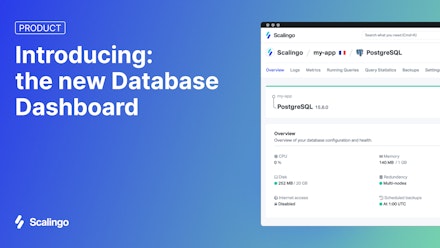New on Scalingo: Add Log Drains to Your Applications and Add-Ons

We are happy to announce the general availability of log drains. They arrive to complement our existing logs. And you can now add them for free. Let's cover everything you need to know.
What Is a Log Drain?
A log drain allows you to send your logs to a remote entity that will write them down. This way, you can take full control of how your logs are processed. There are multiple benefits to this approach:
- You can aggregate all your logs in one place.
- This gives you the ability to have fast real-time search across all your logs.
- And to visualize them the way you need to.
- Finally, you can also analyze your logs and set different kinds of events such as sending alerts when something abnormal is happening.
Add Log Drains To Applications and Add-Ons
In addition to the ability to add log drains to your applications, you are also able to add log drains to your add-ons.
Scalingo currently supports log drains only on databases: MySQL, PostgreSQL, MongoDB, Redis, InfluxDB, and Elasticsearch.
Finally, you can add multiple log drains to a single application or add-on.
Does Adding a Log Drain Disable the Logs on Scalingo?
No.
If you add a log drain to an application or add-on, you will still be able to see the logs on Scalingo through the CLI and the web dashboard in the "Logs" tab.
And archives are still the same.
You can check our logs storage policy and the difference between what we consider cold logs and hot logs in the dedicated Logs documentation page.
Supported Solutions
To accommodate as many use cases as possible, we support a large variety of solutions you can send your logs to.
Host the ELK Stack on Scalingo
Many of our customers come to Scalingo because we care about data governance. So it's natural we provide you with the ability to process your logs directly on Scalingo. The ELK stack includes:
- Elasticsearch: a distributed full-text search engine, able to store JSON document and index them efficiently, it is responsible for the storage of all the incoming data.
- Logstash: a data processing pipeline, any source sends data as input. It is able to format and modify data on the fly before forwarding it to the chosen destination (usually an Elasticsearch database).
- Kibana: a powerful web-based data visualization tool providing everything you need to explore your data and build useful and efficient dashboards.
Third-Party Solutions
We support all the major services such as Datadog, Logentries, OVH-hosted Graylog, and Papertrail.
Any Syslog Server
Scalingo also supports the ability to send your application and add-on logs using the standard Syslog protocol over UDP, TCP, or TCP+TLS.
Documentation
We already have all of the documentation you need to start using log drains.
All the instructions you need to add a drain and send logs to the solution of your choice, list the existing log drains of an application or add-on and remove them:
Add, Remove, and List Log Drains
If you want to use the ELK stack on Scalingo, we have written a guide that will allow you to install it in just a few minutes:
Getting started with the ELK Stack on Scalingo
Photo by Ivan Bandura on Unsplash



